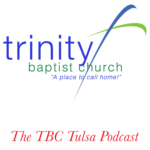Podcast: Play in new window | Download (11.3MB)
Subscribe: Apple Podcasts | Email | TuneIn | RSS

This message by Pastor Rod Harris was delivered at Trinity Baptist Church on Sunday evening, October 29, 2017.
Intro:
Growing up in a Baptist church in the heart of the “Bible Belt” I hadn’t thought much about it. I went to school with, played ball with, ran the neighborhood with kids who were Catholic, Methodist, Church of Christ, Assembly of God and other normal kids - you know, Baptists.
[sections collapse="always"][section title="Read More"]
I don’t remember why or where but I remember the first time I saw a form that asked for religious preference and listed was Catholic, Protestant, Jew or other. I remember thinking, “Is that it? Am I other or should I write in Baptist?” Later, in college, I remember coming across the little book by J.M. Carroll, “The Trail of Blood.” Carroll claimed that we Baptist were not Protestants we were part of a heritage that went back to Christ himself and were not tainted by the Catholic church. I kind of liked that idea. It seemed so pure. The more I studied and looked into the matter, I came to the conclusion I’d rather be identified with the Catholics then some of the folks referenced in Carroll’s book! Later in college I came across some writings that were very anti-Catholic. Some written by people I greatly admired and respected for their theological knowledge and insight who spoke of the pope as the antichrist. This sounds serious. I guess I really need to understand what the differences are and why they matter.
This year marks the 500th anniversary of the Protestant Reformation. In fact it was 500 years ago this coming Tuesday, October 31 that Martin Luther struck the match that ignited the Reformation. The groundwork for the Reformation was laid by the various reform movements of late medieval Christianity, by the increased interest in learning that marked the renaissance, and by the printing press. Europe was ripe for Reformation. All it needed was a spark. That came when Luther, a German monk, nailed his 95 thesis to the door of Wittenberg’s Castle Church. The door was a public bulletin board. The thesis were written in Latin. It was a call for scholarly debate within the church. The 95 thesis were not focused on great doctrinal issues as much as some of the errant practices within the church. Front and center was the selling of “indulgences.” Johann Tetzel was touring Germany at the time, collecting money in return for the promise that the pope would release dead relatives from purgatory. Indulgences are a release from temporary punishments that the Roman Catholic Church said that people receive for sins they commit, sins which were not bad enough to send people to hell. Martin Luther argued that the pope had no such power, and if he did, then he ought to use it—without monetary return and as an act of love—to remit all temporal punishment.
The pope got word of the thesis, he sent a representative to debate Luther in the hopes of silencing this “wild boar loose in the vineyard of Christ.” The hope was to get Luther to deny the authority of the pope thus Luther would be discredited and excommunicated. Luther obliged. The pope sent the paper declaring Luther was a heretic and was excluded from Christ’s church. Luther burned the announcement and the Reformation was on. That is a very condensed version of the story. The whole tale is fascinating, full of intrigue, political wrangling, kidnapping, charges and counter charges and is worth your time in studying.
Frequently the Reformation is described as a movement that revolved around two pivotal issues. The so-called “material” cause was the debate over sola fide (“justification by faith alone”). The “formal” cause, sola Scriptura, that the Bible and the Bible alone has the authority to bind the conscience of the believer. Luther had no desire to start another church - he sought to reform the church from within. From Luther and later Calvin and the other reformers, at issue was the gospel. How are we saved?
Out of the debate came the 5 solas of the Reformation:
- Sola Scriptura - Scripture alone
- Sola gratia - grace alone
- Sola fide - faith alone
- Sola Christo - Christ alone
- Soli Deo gloria - glory of God alone
The Roman Catholic Church taught that the Bible was the Word of God and that the Church was its interpreter. Church tradition, the teaching of the church was thus, in practical terms, on equal par with the Scripture. They also taught that salvation was by grace but not grace alone. This is where the issue of justification comes in.
The Roman Catholic Church taught then and still does today that righteousness is infused - we become righteous through faith and the sacraments of the church. Luther and the reformers taught that righteousness is imputed to us. Abraham believed God and it was counted or credited to him as righteousness. We need an alien righteousness, a righteousness outside of ourselves. The word “justification” in Scripture is a forensic term. We are declared righteous. We are declared justified in the sight of God because of Christ.
You may think this is a matter of theological hair splitting - it is not! Rome understood that and at the council of Trent 1545-1563 declared the teaching heretical and anathematized it - damned it. To this day, according to Rome, we who believe in salvation by grace alone, through faith alone, in Christ alone are outside of the Church and believe a damnable doctrine.
What we see in the Reformation is a recovery of the biblical gospel. What Rome sees is the abandonment of the biblical gospel. We believe a different gospel. We can’t both be right. If we are to take Paul seriously in Galatians 1:6-9 this matters!
I am astonished that you are so quickly deserting him who called you in the grace of Christ and are turning to a different gospel—not that there is another one, but there are some who trouble you and want to distort the gospel of Christ. But even if we or an angel from heaven should preach to you a gospel contrary to the one we preached to you, let him be accursed. As we have said before, so now I say again: If anyone is preaching to you a gospel contrary to the one you received, let him be accursed.
The question is not sincerity. It is not simply - really believe what your believe, be genuine in it. What you believe matters. What is your authority? The Word of God or the Church? There are other differences but this is the core, the heart of the matter.
I’m a Baptist by conviction. I’m convinced that as a Baptist I’m a child of the Reformation, I’m a Protestant. I believe Baptist have our roots in English Separatism that grew out of Anglicanism that grew out of Catholicism through the Reformation. The other stream into Baptist life are the Anabaptist or the “Radical Reformers.” They thought the Reformers didn’t go far enough.
I’m convinced by Scripture that salvation is by grace alone, through faith alone in Christ alone to the glory of God alone. And I’m grateful for Luther, Calvin, Zwingli, Knox and their heirs. I’m grateful for the recovery of the biblical gospel and I believe the church must be always reforming in that we are to constantly bring our lives inline with Scripture. Further, I’m convinced that the church, the visible church, the local assembly will always be a mixed people this side of eternity. The tares will grow alongside the wheat. The “perfect church” does not exist. Thus in humility and grace we strive to live godly lives. We strive to order the church according to the Word of God.
What is to be our attitude toward the Church of Rome? How are we to think of our Roman Catholic friends? I think the Church of Rome is a false church because, as a church, it denies the biblical gospel. I believe there are genuine Christians who are members of the Roman Church and they are genuine believers in spite of what their church teaches not because of what their church teaches. By the way, I don’t believe all Baptist are genuine believers. I think there are many false professors in the Baptist church. There will be some Baptists among that crowd saying, “But Lord we did all these things in your name” and He will say, “Depart from me, I never knew you.”
As we approach the 500th anniversary of the Reformation we should pray as we do every day, "Lord be merciful to me, the sinner.” We are saved by the grace of God and to him alone belongs the glory.
[/section][/sections]
